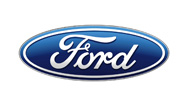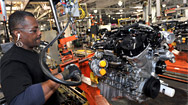Building Shared Commitment and Capability
On this page
It is important that our suppliers share our commitment to environmental and social responsibility. Shared commitment improves the flow and quality of information critical to continuity of supply and compliance with regulations. Shared commitment helps to ensure efficiency and quality throughout the supply chain, and it helps us avoid risks to our operations and reputation that can arise due to substandard practices in our supply chain.
We encourage our suppliers to manage sustainability issues and risks within their own operations and supply chains, and we provide them with tools to build the capability to do this. For example, we have developed in-depth resource guides and sponsored presentations by subject-matter experts on issues such as human rights and greenhouse gas emissions. We have provided worksheets on emissions tracking and reporting and on code of conduct development. And we are sharing training materials we have developed (discussed below), as well as information and guidance on our compliance and training processes. Finally, we have committed to working with suppliers to help resolve issues and concerns.
While we provide training and guidance to suppliers on a range of sustainability issues, we have developed a detailed training program on human rights issues. The program includes training and follow-up assessments and requires remediation of substandard practices as necessary. This program is described in more detail in Human Rights in the Supply Chain: Building Supplier Capability through Localized Training and Collaboration.
Ford’s ability to assess and influence the sustainability performance of our supply chain decreases the further suppliers are removed from us. It is challenging, for example, to influence and assess our Tier 1 suppliers’ third- or fourth-tier suppliers. Fortunately, many of our Tier 1 suppliers are major multinational companies that already have the capability to implement and manage sustainability initiatives for their own operations and their own supply chains. Thus, we work hard to align these Tier 1 suppliers to our sustainability goals and rely on them to help us maintain a clear and consistent message as far down our supply chain as possible.
Setting Requirements for Sustainability Issues in Our Supplier Contracts and Guides
The basis of our sustainability work with suppliers is the Ford Code of Human Rights, Basic Working Conditions and Corporate Responsibility. We first adopted this Code in 2003 and then formally issued it as Policy Letter 24 in 2007. The Code addresses workplace issues such as working hours, child labor, forced labor, nondiscrimination, freedom of association, and health and safety, as well as environmental issues and other topics. Though this Code applies directly to our own operations, we seek to do business with companies that have standards consistent with our Code. In 2012, Policy Letter 24 was revised to specifically communicate our encouragement of suppliers to adopt and enforce similar policies for their suppliers and subcontractors.
We incorporate requirements about sustainability management in our Global Terms and Conditions, the contract to which every supplier doing business with Ford is subject. This core contract dictates our prohibition of the use of forced labor, child labor and physical disciplinary abuse. These requirements were added in January 2004 for production suppliers and in September 2005 for all others. Policy Letter 24 provides the standard for this contract, and the Terms and Conditions stipulate that that standard supersedes local law if it is more stringent. The Global Terms and Conditions also prohibit any practice in violation of local laws.
In addition, the Global Terms and Conditions serve to:
- Set the expectation that suppliers will work toward alignment with our Code in their own operations and their respective supply chains in the areas of harassment and discrimination, health and safety, wages and benefits, freedom of association, working hours, bribery and corruption, community engagement and environmental responsibility
- Make clear Ford’s right to perform third-party site assessments to evaluate supplier performance
- Communicate that Ford can terminate the relationship for noncompliance or for failure to address noncompliance in a timely manner
Our Global Terms and Conditions are accompanied by Supplier Social Responsibility, Anti-Corruption, and Environmental Requirements Web-Guides, which further outline our expectations. For example, the supplier guide that covers human rights and working conditions amplifies the expectations set out in the Terms and Conditions, provides specific guidance and recommendations for self-assessments and alerts suppliers to the availability of factory-level training. In April 2012, we reissued these Guides with extensive edits, such that clearer guidance is provided on due diligence for conflict-free sourcing, business ethics, anti-corruption actions, environmental specifications for engineering and working conditions expectations.
Going Further with Our ABF Suppliers
For our strategic ABF suppliers – which supply more than 65 percent of our annual buy – we have developed a rigorous process for managing sustainability issues that builds on the above but also goes further. The intent is for our ABF suppliers to wholly own responsibility for sustainability expectations and performance in their supply chain.
We encourage our ABF suppliers to develop a shared commitment to our sustainability goals and effective systems for managing sustainability issues through a three-phase developmental process:
- Verify Supplier Code of Conduct We ensure that our ABF suppliers have, or develop, a code of conduct aligned with our Code of Human Rights, Basic Working Conditions and Corporate Responsibility.
- Training and Compliance We provide training as needed to our ABF suppliers and ask them to conduct their own internal trainings to ensure that their employees understand their code of conduct. We also ask suppliers to develop a rigorous compliance process supporting their code.
- Extending Expectations to Their Supply Chain Finally, we ask our ABF suppliers to extend our shared sustainability goals and expectations to their own suppliers, expanding the impact of our sustainability goals throughout the multiple tiers of our supply chain.
The Ford Supply Chain Sustainability staff have implemented a robust process of review at each of the three phases, or milestones, of this developmental process. To date, more than 80 percent of our Production ABF suppliers have demonstrated that they have codes of conduct in place that are aligned with international standards, and 35 percent of our ABF suppliers have demonstrated that they have met all three Ford milestones – that is, they have aligned codes of conduct in place supported by robust management systems governing their own operations and their supply chain. ABF suppliers also still participate in our factory-level human rights working conditions program if requested by Ford.
Through our work with ABF suppliers, we have identified key success factors that enable companies to make progress in managing sustainability issues in their own supply chains, including:
- the identification of executive decision makers to coordinate cross-functional efforts;
- the support of executive management and/or the Board of Directors; and
- implementation support from Ford in the form of discussion facilitation and/or individual or regional in-person meetings.
The extension of working conditions and environmental expectations to the ABF companies’ own supply base has proven to be the biggest challenge, given resource constraints and general lack of expertise and knowledge of the issues. The creation of tools and guidance by work groups at the Automotive Industry Action Group, and by the United Nations Global Compact, have been useful to our ABF suppliers in their development of sustainable supply chain systems.
Supplier Corporate Responsibility Recognition of Achievement Award
For several years, Ford has recognized supplier companies that demonstrate leadership in environmental and social performance with a corporate responsibility award. Suppliers must meet several criteria, including ISO 14001 certification at all manufacturing sites, an operational code of conduct aligned with international standards, an exemplary material management reporting record and demonstration of overall sustainability leadership by incorporating environmental and social considerations into their business.
In May 2012, Ford selected one winner for the 2011 Corporate Responsibility Recognition of Achievement Award: Saturn Electronics and Engineering.










